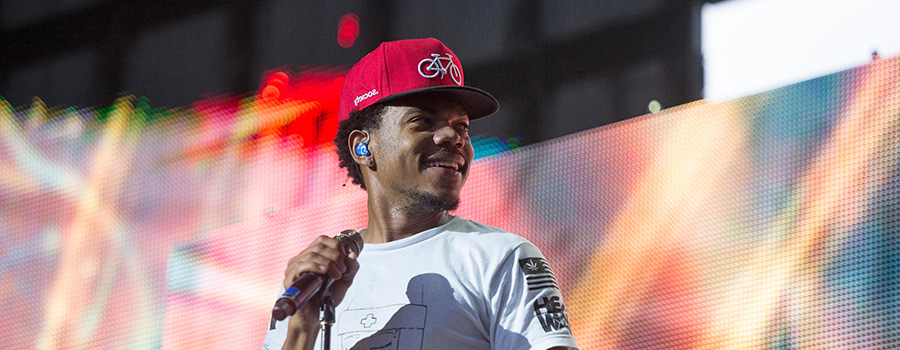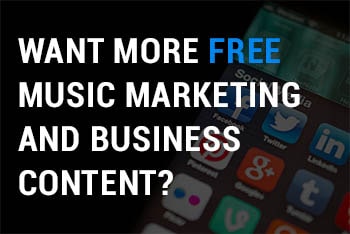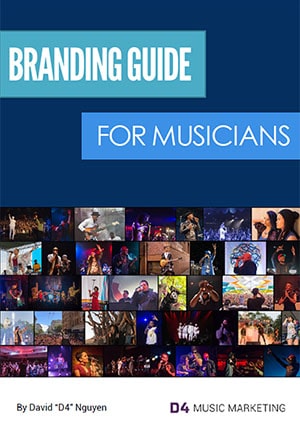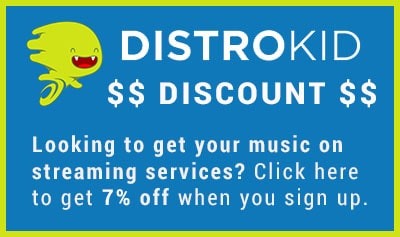
Photo Credit: Rob Loud
The music industry is not the same as it was 20 years ago. You no longer need to be signed by a record label to actually have a legitimate career in music. Now, it is much easier to be an independent musician, but at the same time, growing a fan base and making a decent living from music is a challenge.
One of the problems in an evolving music economy is that selling records has become an unsustainable source of income for music artists. Buying music is becoming a thing of the past… at least as a form of music discovery. This romanticized idea of musicians selling music as a product is, strangely, fading.
Admittedly, selling albums was never the most important source of income for independent artists, but it took away a starting point for lesser-known musicians who don’t quite have the exposure to do well-paid shows and tours. In order to help open up or strengthen those other income streams, you need to develop your brand.
The number one priority for independent artists, specifically less established ones, should be to grow their audience and fan base. Your ability to do this is going to be based on the cohesiveness of your brand. It will require you to abandon the mindset of generating sales as your primary focus to one that is dedicated to nurturing your audience to create loyal fans.
In other words, stop thinking about sales and transactions (short term), and start focusing on branding and strengthening relationships (long term).
What does it mean to have a branding mindset?
Simply put, you value relationships over sales.
It often means doing things that provide some form of value to your audience and make your fans happy, but do not bring a direct or immediate monetary benefit to your business. Another way to look at it is as a long term investment, whether it’s your time, money or profits, for a larger return in the future.
Some things you can do to build your brand are:
- Signing autographs and taking pictures at the end of your set
- Responding to comments and questions on social media
- Engaging with your audience by interacting with their content
- Putting out content your fans like (not always have to be music related)
With a branding mindset, you are more invested in your fan relationships than generating sales. Your priority as a musician is to not only widen your audience, but also deepen it over time with a strong brand and consistently putting out good music. That’s how you’re going to improve your chances of financially supporting yourself with a music career.
On the other hand, when you have a transactional mindset, your priorities revolve more around what brings in the money through immediate sales transactions. If you thought getting into the music business would yield money from the start, you will be disappointed. A career in music can be fulfilling, but it’s not going to happen if you have a transactional or short-sighted approach. To put yourself in a winning position in the music business, you’re going to need to hold on to that day job for a bit longer.
What do I need for a branding mindset?
To make the most out of a branding mindset, you’re required to really know yourself (self-awareness) and establish a brand identity that is strategic for attracting the right audience for you.
Secondly, you need to provide value and engage your audience. You want to nurture the relationship you have with your fans by being accessible, interacting with them and giving them content they like.
Now is the time to adapt and transition to a long term mindset. If I haven’t convinced you yet, here are 7 reasons why embracing a branding mindset is essential to succeed in today’s music climate.
1. Music consumption patterns have changed
I’m sure you have all heard by now that record sales have been declining since the early 2000s. First, it was the MP3s and P2P (peer-to-peer) file-sharing networks. Once networks like Napster got shut down, BitTorrents took over as a way of downloading music illegally. Companies that offered legal digital downloads for music (iTunes) became more popular after news of major labels suing the crap out of people who got caught with pirated songs.
Now, even digital downloads are seeing a decline as music streaming subscriptions have become the next evolution of music consumption.
What we are seeing as a society is this gradual transition where accessibility is being favored over ownership. This technological disruption brought about by streaming services extends beyond the music industry. Movies and DVDs are experiencing a gradual decline in consumer ownership with services like Netflix and Hulu offering on-demand streaming at low cost. Other industries are being disrupted as well, like transportation (Uber) and temporary housing (AirBnB).
This shift into digital streaming has even changed how the industry evaluates certifications. In early 2016, the Recording Industry Association of America (RIAA) changed its certification formula to account for album streaming numbers, which represents the next step in its legitimacy.
Unfortunately, the rise of music streaming leaves little room for the typical music transaction – record sales. From a practical standpoint, depending solely on sales will limit your potential to grow and sustain yourself through music.
Read more about how streaming is changing the ways we consume music.
As grim as it sounds for the future of the music industry, there’s still hope. A new model is emerging where music is no longer the commodity. Branding is going to be the key that will unlock more opportunities for you, which leads to the next point.
“And streaming, I don’t personally feel that music will be monetizable in a very foreseeable way. I think that we should focus on musicians as brands, and we’re lucky enough to use music as our brand builder, as our calling card. The future of the music business is learning to build brands around artists so that artists get to have equity in.” – Jewel
2. Branding sells: Musicians are becoming the commodity
Music consumption isn’t the only thing that has changed with the growth of the internet over the past decade.
With the decline of record sales, record labels have obviously needed to adapt in order to survive the changes in the music business and make back their investments in artists. “360 deals” became a popular record contract for this reason. In the past, traditional record contracts were solely recouping the investments record labels made in their artists through record sales, leaving other income streams untouched for the artists to take advantage of. Now, labels need a hand in all incomes streams including live shows, merchandise and publishing to survive in this business.
The same can be said about artists. Selling actual music is no longer the main commodity for making money as a musician. Branding is what will generate revenue in the form of live shows and merch. This is because an artist doesn’t sell music or CDs; they sell an experience. The experiences they provide weave an emotional connection and serve as a personal identity for fans to proudly wear.
If I’m emotionally invested in an artist, I will do whatever to support them, whether it’s buying all their albums, copping some shirts or seeing them live nine times, like I have with my favorite duo Atmosphere. That’s branding in action.
In order to maximize your gains from branding, you need to look at music as content and not only as a product to sell.
Music is content, personality is a commodity
As a marketer, I don’t think about songs, music videos, and albums as products anymore. I think of them as content. The real product is you and your brand, and the experiences or emotional investments you provide along the way.
In this new paradigm, your product is your brand and personality. How much people will pay to see you live and buy your merch is tied directly to your branding. Your product is yourself, and the branding you use directly determines if you sell (or don’t). I truly believe that if you can attract your real fans, they will support you financially, whether it’s by seeing you live or buying your shirts.
In our current technological state, we are overrun with entertainers, artists, Youtube personalities and vloggers. These content creators understand that releasing content regularly is essential to keeping an audience engaged. Musicians are naturally falling into this same category, so it’s important to release consistent content to keep your current fans happy.
Remember that music is content that is a means to an end, which is why it’s such a huge piece of your marketing and branding efforts. That end you’re working to reach is the ability to monetize your brand through different income sources like live experiences, merch (which include physical music) and sponsorships. So instead of looking at music videos as tools to sell song downloads or records, you can look at it as content for fans to engage with and help raise brand awareness when they share it.
With the shift to streaming music, I see new music or your latest album as content that ignites excitement to sell live shows and merch (where the money is).
3. There’s very high competition for attention
With the ability for anyone to put their music online, the competition for attention is higher than ever. It’s much more difficult now to stand out from all this clutter, let alone make a sustainable living as an independent artist. Not only are you competing with other musicians on social media, but you are also going up against other businesses, friends, family, celebrities, sports and cute animal videos cluttering people’s newsfeeds.
In order to succeed in this environment, you have to know how to set yourself apart instead of worrying about getting someone to buy your record.
Even though streaming presents its own obstacles, it’s actually for the better since it forces independent musicians to really focus on presenting something new and unique through their brand. A strong brand gives people a reason to pay attention and consider developing a relationship with you. Go all-in on your brand to truly understand what it is that makes you special and communicate that to your fans.
In addition to branding, you might need to change up your marketing strategy. If you haven’t made a name for yourself, you have to lower the barrier to discovery, which often means offering your music for free. While this directly goes against a transactional mindset, I would argue it is becoming necessary.
Some will say you shouldn’t put out too much free music, because it tarnishes your branding and conditions people to not pay for your records. I would argue that it doesn’t matter when you are still working on breaking into the industry.
You can read more about if you should give away your music free as musician.
4. We make decisions based on emotion, not logic
Understanding the role of emotions in business is important as it pertains to branding. Research has shown that humans make most purchasing decisions based on emotion. As consumers, we ultimately decide who we like based on how a brand makes us feel, rather than what is logical. By investing in branding, you are strategically improving your appeal to people’s emotions by presenting yourself as someone relatable or admirable.
Typically, after making an emotionally-driven buying decision, we come up with a rationale that supports the decision we made. This prevents or alleviates buyer’s remorse. Advertisers have capitalized on this phenomenon, and most of all modern marketing exploits this fact.
I think a lot of newer artists think that they can make “good” music and expect it to sell itself. I understand why that seems logical. But what people with a transactional mindset don’t realize is that the things we buy, movies we watch and music we listen to are not based on logic.
We rarely buy music simply because the artist is super talented. There are other elements that come into play that influence our decision. I know damn well we all buy music from people who are not the best singers or rappers in the world. Instead, they appeal to us through branding elements, like their personality, style and values.
The point here is that when you invest in your branding, you’re giving fans a compelling reason to be attached to you and your music. You are making a strategic effort to separate yourself from others and create a positive emotional response to your brand. After all, the cohesiveness of your brand is going to dictate your ability to develop emotional connections with your fans.
5. The lifetime value of a fan is worth more than an upfront transaction
I feel that in American culture we are conditioned to be overly focused on the short term and lack patience to see the larger benefit of investing long term. You can counter this by not looking at each fan as a potential album sale and thinking of each person in terms of their lifetime value instead.
Each fan can generate a certain amount of revenue for you throughout your career. By developing a stronger relationship with fans through your brand, you effectively increase their lifetime value. This is what I mean by the long term game. The amount of money you can make over time will increase when you focus on building your audience and maximizing exposure before concentrating on sales and transactions.
In business, it costs more money to acquire new customers, clients or fans than retaining the ones you already have. If you’re caught up always trying to procure new fans and neglecting the community you already built, you may need to revise your strategy as it doesn’t make any business sense.
Instead of constantly thinking about fan acquisition, shift to a more balanced approach of zeroing in on fan retention and loyalty. To accomplish this, you will need to focus on:
- Fan engagement and interaction
- Increasing accessibility to your music
- Releasing good and consistent content
Another benefit of focusing on fan retention is that lifetime fans give you repeat business and are your best advocates via word of mouth. This means you want to make sure the fans you capture stay loyal to you throughout your career. Branding and consistent content is the glue that will motivate fans to stick around.
6. Your audience / fan base is your most important asset
At the end of the day, your most valuable asset as an artist or musician is your audience. This is why it’s so important for your branding to speak to your fans and nurture the emotional connection they feel through your music. Since your fan base supports you financially and serves as a tool for word of mouth marketing, you have every reason to always have their best interests, needs and wants at the forefront of any business decision.
The main takeaway here: Your ability to create and grow an audience effectively will depend on the strength of your brand and how much you invest in fan relationships outside of just releasing music.
As you may have already experienced, it is no easy task to build and maintain fans’ attention. After you have built a robust fan base and have treated them as valued individuals, you can begin to leverage your audience to generate sales through different income streams.
7. The road to independent success is a marathon, not a sprint
I know from watching the independent artists I’ve followed for the past 15 years that it takes time to become established. The local artists I work with and meet can all attest to this. Of course, you’ll have the select few who blow up quickly in a few years, but it’s rare.
Music marketing experts and artists will tell you that this business is a marathon, not a sprint. If you’re looking to cash in on an album without establishing a strong brand and audience, you’re heading towards disappointment.
Coming into the music industry with a transactional mindset will only foster dissatisfaction and frustration, especially with all the changes that have occurred in the industry. You need to make a name for yourself, create good music and have a track record of providing quality content before you can expect people to make any type of monetary transaction with you.
And this doesn’t just apply to musicians and artists; it goes for anyone trying to establish their own independently built business!
The biggest reason why a career in music is a lengthy and difficult journey is the nature of relationships. Relationships and trust take time to develop. Not just with fans, but with industry insiders including promoters, bookers, agents, artists, venues and producers. This circles back to why branding is so important for long term success.
Patience and perseverance are the keys to relationship building. In addition, you have to distinguish what the right priorities are that will help you achieve lasting relationships. Maintaining mutual respect and trust in your relationships is more valuable and will make you more money long term than getting one time transactions early on.
Success starts with the right mindset and some sacrifices; the money will follow.
Conclusion
There you have it. Seven reasons why a branding mindset is the way to go in this new music economy where record sales will only continue to decline. As music discovery is no longer dependent on consumers actually buying physical music, a transactional mindset is becoming less relevant.
Pursuing a career in music may seem more difficult now when you have to deal with a new set of challenges that prior generations of musicians didn’t have to endure. But that’s the price you pay for the freedom of being independent. As consumer behavior changes, indie artists need to pay attention and adapt to shifts in the industry to succeed. Adopting a branding mindset is going to be the key that allows musicians to monetize through multiple income streams in the long run.
With that being said, making those investments in your brand is more crucial than ever. Success comes down to relationship building and emotional investments. It takes time to build a strong brand, but that’s how you’ll survive pursuing your passion as a musician. After all, you want lifetime fans, not one time customers.







